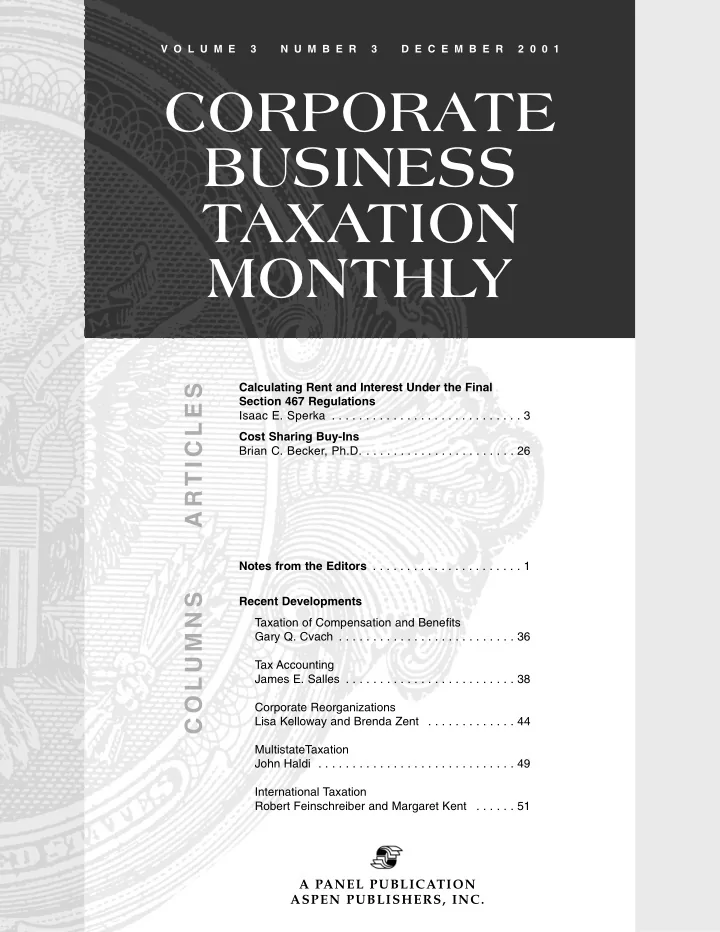

V O L U M E 3 N U M B E R 3 D E C E M B E R 2 0 0 1 CORPORATE BUSINESS TAXATION MONTHLY A R T I C L E S Calculating Rent and Interest Under the Final Section 467 Regulations Isaac E. Sperka . . . . . . . . . . . . . . . . . . . . . . . . . . . . 3 Cost Sharing Buy-Ins Brian C. Becker, Ph.D. . . . . . . . . . . . . . . . . . . . . . . 26 Notes from the Editors . . . . . . . . . . . . . . . . . . . . . . 1 C O L U M N S Recent Developments Taxation of Compensation and Benefits Gary Q. Cvach . . . . . . . . . . . . . . . . . . . . . . . . . . 36 Tax Accounting James E. Salles . . . . . . . . . . . . . . . . . . . . . . . . . 38 Corporate Reorganizations Lisa Kelloway and Brenda Zent . . . . . . . . . . . . . 44 MultistateTaxation John Haldi . . . . . . . . . . . . . . . . . . . . . . . . . . . . . 49 International Taxation Robert Feinschreiber and Margaret Kent . . . . . . 51 A PANEL PUBLICATION ASPEN PUBLISHERS, INC.
C O R P O R A T E B U S I N E S S T A X A T I O N M O N T H L Y Tax Accounting BY JAMES E. SALLES The regulations governing long-term contracts, 6 which T his month’s column discusses the “proposed apply to all taxpayers, provide likewise, although spe- capitalization principles” recently submitted to cial rules apply in determining “economic performance” the IRS by the “ INDOPCO coalition.” The coali- tion is a group of large corporate taxpayers, 1 some of in relation to such contracts. 7 This proposition is not beyond question, however. The which have litigated capitalization issues in the recent past. 2 Its proposal was submitted under cover of a let- “economic performance” rules added a third element to the traditional two-prong “all events” test: that “all events” ter to Commissioner Rossotti on September 6, and have occurred which determine the fact of liability and became public in October. 3 that its amount be determinable with “reasonable accu- Although not written in full-blown regulatory format, racy.” 8 However, although the applicable rules were very the voluminous proposal was clearly designed as a similar, there was authority that, strictly speaking, the “all possible outline for pending proposed regulations. events” test for deductions did not apply to inclusions in Christine Turgeon, the Treasury point person on the reg- basis. 9 There was thus some doubt about whether the ulations project, has since informally responded at the “economic performance” rules could affect the timing of annual meeting of the Tax Executives Institute in late October. 4 The discussion that follows touches on some capital outlays. Application of the regulations’ approach to overturn the well-settled case law that allowed real of the highlights of the coalition proposal. estate developers to include estimated future costs to GENERAL PRINCIPLES complete “common improvements” in the basis of lots sold 10 was very controversial. The IRS wound up apply- Timing of Capitalization ing the new rule prospectively 11 and issuing a taxpayer- The proposal contains an overview of capitalization favorable revenue procedure allowing the first expenses and how it works. Significantly, given its source and incurred in a given development to be attributed to the first lots sold. 12 The issue has never been fully thrashed generally pro-taxpayer complexion, the proposal explicitly adopts the government position that an out in court. expenditure may be “taken into account” by capitaliza- Cash Basis Taxpayers tion only when it would otherwise become allowable as The timing rules in the proposal have implications for a deduction. In no event will this be sooner than when cash basis taxpayers as well. Cash basis taxpayers the expenditure is “incurred,” which the regulations cannot take a deduction for money that they merely define by reference to the “all events” test that applies owe, even if they give a note which might be taxable to to deductions by accrual basis taxpayers. 5 the recipient. Can they include it in the basis of proper- Since the economic performance rules were enacted ty? As discussed above, the regulations make clear in 1984, the IRS position has been that accrual taxpay- that accrual taxpayers cannot include a liability in basis ers cannot capitalize outlays until the full “all events” until it is “incurred” under the “all events” test. However, test, including the economic performance requirement, the corresponding rules for cash basis taxpayers refer has been met. The regulations under Code Section only to deductions 13 and do not expressly address inclu- 461, since they were rewritten to reflect the economic sion in basis. performance requirement, have so provided explicitly. The government nonetheless argued successfully in Owen v. United States 14 that cash basis taxpayers, like Jim Salles is a member of Caplin & Drysdale in Washington, D.C. accrual taxpayers, should not be able to capitalize costs 38 38 D E C E M B E R 2 0 0 1
Recommend
More recommend